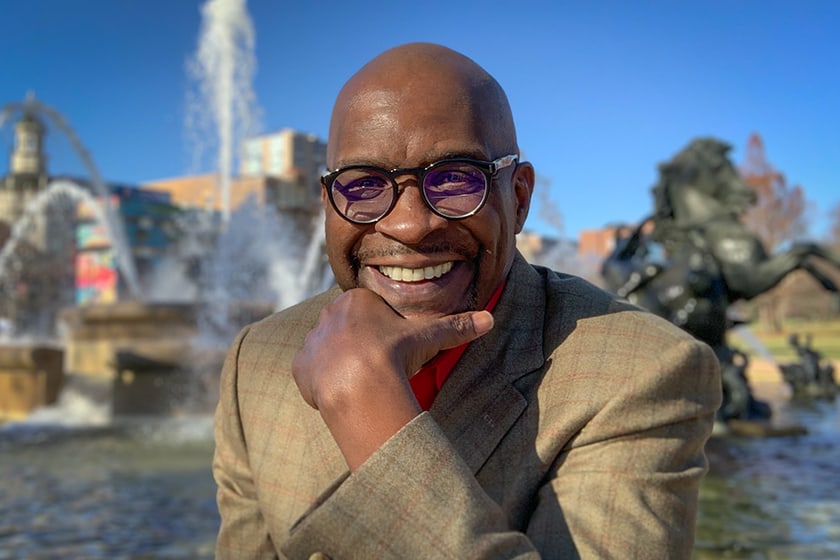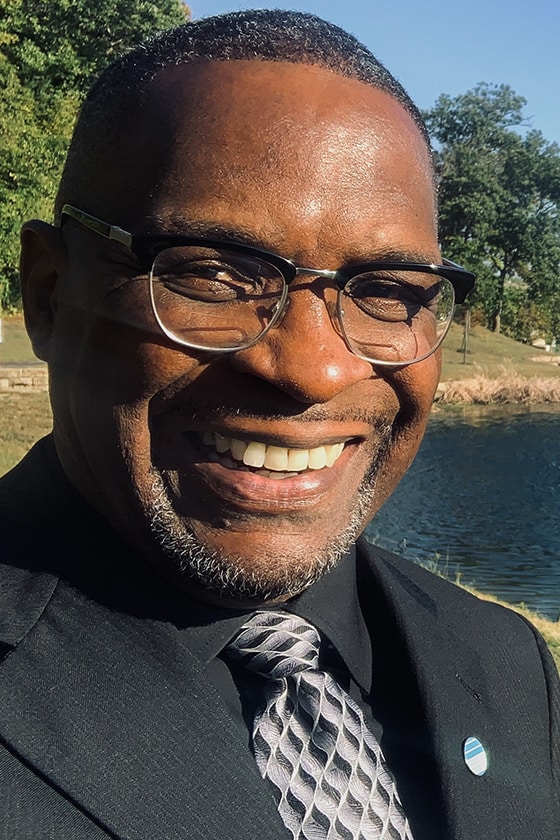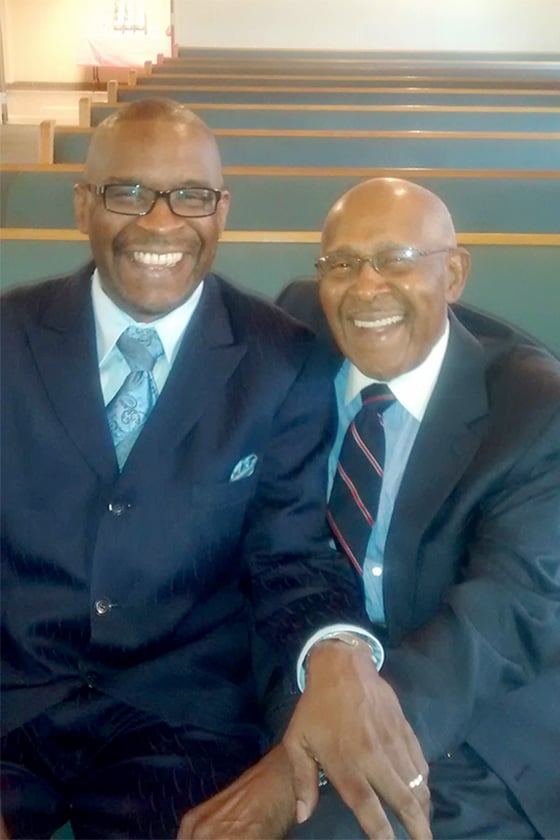-
A RING AND A ROBE
A pastor’s kid and star athlete struggled to know who he was—until he came home
Some might say sports are in Stephen Barbee’s blood. His father was recruited by several professional baseball teams. He refused to play games on Sundays and became a preacher instead. But for Stephen, growing up in Kansas in the 1970s, football, track, and baseball were everything.
His dad was present at every game. Stephen remembers one football game in particular; he fumbled the ball and the crowd groaned. Above the crowd, he heard the voice of his father: “Shake it off, son. Keep your head up.”
Athletic achievement gave Stephen—a pastor’s kid who was more often associated with his dad’s name than his own—a chance to establish an identity of his choosing. It felt good to be admired, but this world also brought new temptations: alcohol, marijuana, and then harder drugs.
“It was kind of like a split personality: the athlete, the drunk, the student,” Stephen recalls. “I had all of these different masks I was living out.”
Stephen attended Highland Community College on a full scholarship for baseball and was an All-American football player. Then one day, after transferring to Peru State College in Nebraska, it all came crashing down. Stephen got blackout drunk, and his behavior was so bad that he was expelled. In that moment, his athletic career was over.
THE ROLLER COASTER OF ADDICTION
In the spring of 1986, Stephen came home depressed and discouraged. Sometimes he prayed, but his childhood faith didn’t hold much meaning for him. Stephen jumped at the opportunity to coach college football nearby—but when he was caught partying with the players, he was fired.
“My addiction always overshadowed my dreams,” he says.
This truth continued to play out in his life. In pursuit of a woman, Stephen moved to Chicago. The relationship fizzled and Stephen started using crack.
“I lost everything. I was walking the streets, literally eating dry cereal for two days straight,” he remembers.
During that time, he would pray, “God, deliver me … don’t let me die in my addiction.” He eventually ended up at a homeless shelter called Pacific Garden Mission, where he found safe housing, got sober, and rededicated his life to Christ.
Pacific Garden Mission included street evangelism as part of its discipleship program. In August of 1991, Stephen gave a tract to a young woman—and she eventually became his wife.
The couple had two children and bought a four-bedroom house in the suburbs. Stephen earned his bachelor’s degree in communication and got a job as a chaplain at a health clinic. He went on to become the men’s division director at Pacific Garden Mission and began work on his master’s degree. Though Stephen was busy with ministry, not everything was right at home. The marriage was suffering—and one day, Stephen’s wife told him she was leaving.
Alone in his house, Stephen decided—after 10 years of sobriety—to have a beer. And then two. The voice of temptation was loud and clear.
“The voice says, ‘You haven’t had a hit of crack in over 10 years. You deserve one,’” Stephen recalls. “And so that night, I went out and smoked about $700 worth of crack cocaine.”
HARD CONSEQUENCES
Immediately, Stephen was back in the grip of addiction. He lost his job and his house; he returned to Kansas in 2001 with only the clothes he was wearing.
For the next six years, Stephen cycled through addiction—going to treatment, getting back into church, and then relapsing. At one point, Stephen’s father—who was firm on his boundary that Stephen could not live under his roof while using—drove him to a homeless shelter.
“He opened the car door and he said, ‘Son, I love you, but you have to go,’” Stephen says.
Stephen could live at home if he gave up his drug use—but instead he “chose to live a life of homelessness.” He shoplifted, wrote bad checks, and sold drugs to fund his addiction.
Without realizing it, Stephen was getting high with a confidential informant. Before long, he was arrested and facing federal prison time for the sale of a controlled substance. Between his time in federal detention and his actual sentence, Stephen spent 44 months behind bars.

'My addiction always overshadowed my dreams.'
—Stephen
UNMASKING THE LIES
Almost immediately, Stephen realized he needed to get right with God. He had felt a calling on his life since his time at Pacific Garden Mission—and he knew he needed to walk in this calling. The first step was swearing off drugs and alcohol for good.
“I asked myself one simple question,” Stephen says. “‘How many times was you arrested sober?’ It was never. And so that day, I just told myself, ‘If I just stay off the drugs and alcohol—if that’s all I did for the rest of my life—I would never have to wear the silver handcuffs.’”
But Stephen’s life change did not stop there. His in-prison work assignment was to help with religious services. He learned about many different faiths and was strengthened in his own. He prayed with prisoners and lieutenants alike. From finances to favor with prison guards, Stephen sensed God’s provision at every turn.
But the most powerful display of God’s power came in the form of inner transformation. Stephen realized he had compartmentalized his life since his youth, taking on different masks based on his behaviors and surroundings.
“I came face to face with my mask,” he explains. “The enemy would trick me to say, ‘When you’re in church, He loves you, but when you are in the crack house, He doesn’t.’”
Stephen realized that God’s love doesn’t work that way.
He says, “The Holy Spirit dealt with me, and He told me, ‘I’m still the God that loves you when you’re in your family. I’m still the God that loves you when you’re in church. I’m still the God that loves you when you have a career. And I still love you when you’re out there in the drug world. You built those walls. You have to tear them down, because I’m the God that loves all of you.’”
'I came face to face with my mask.'
—Stephen
GIFTS FROM DAD
When Stephen went to prison, his daughter was 12 and his son was 15. The separation and divorce—as well as Stephen’s addiction—had kept him from being as engaged with them as he wished, but their mother always spoke well of him. That continued while he was incarcerated.
But being unable to see his kids was hard. Stephen struggled, knowing he was missing out on important moments in their lives. He treasured the drawings they sent him of little stick figure families—themselves and their dad—together, the way they wished they could be.
One day, Stephen heard about Prison Fellowship Angel Tree®. Through this program, he sent his children gifts at Christmas, complete with a personal message from him.
The children were thrilled.
“They’re thinking there’s a Kmart inside of prison,” Stephen laughs. “They didn’t realize there were no stores available for me to purchase the gift. But all they know is that they did receive a gift from Dad.”
Stephen sent gifts through Angel Tree for two years and says that the program helped him maintain the important parent-child bond.
“It kept me connected,” Stephen says. “In spite of my setback and my struggles, that was a way to let them know that Dad still loves them.”
'I get to live out my passion and purpose every day.'
—Stephen

SECOND CHANCES
In January 2012, Stephen left prison as a free man. The terms of his parole required him to start working within 15 days—but this, Stephen learned, was easier said than done. He needed an ID but did not have a birth certificate. When he went to get a birth certificate, he was told he needed an ID.
“The system says I need to work, but the system, I felt, was working against me,” he says.
Stephen was finally able to get a birth certificate by going in person to the board of health and paying a fee. He had surmounted the identification hurdle. But at his first job interview, he was told that the business had a strict policy against hiring felons.
“Miss, if I wasn’t a felon, would you hire me?” Stephen asked.
“Most definitely,” the interviewer replied.
“Then thank you,” Stephen said.
The young woman was confused and reiterated that she could not offer him a job. Stephen said that he understood—but that her words helped him know he was still employable.
Sure enough, Stephen was eventually given a second chance and hired in a supervisory position at a homeless shelter. He later worked in home health care, pastored a downtown church, and served as a reentry coordinator for Metro Lutheran Ministries. Then his path took him into prison with an agency called Connections to Success, and he often spoke inside Kansas prisons and at conferences.
Today, Stephen works as a field director for Prison Fellowship®. His favorite part of his job is getting to interact with men on the yard, giving them hope and a word of encouragement.
“I get to live out my passion and purpose every day,” Stephen says. “It’s just a joy.”
Stephen has close relationships with his grown children. He says they have forgiven him for his mistakes, and they love spending time together.

HOME FOR GOOD
Another great blessing in Stephen’s life is his relationship with his father. Stephen’s dad worked as a chaplain for the championship-winning University of Kansas basketball team, and now he pastors a church. Sometimes he invites Stephen to come preach there.
Stephen will never forget the day he was a guest speaker at a missions conference in Kansas City. That morning, he read the story of the prodigal son in his devotions and was moved by the love of the father in the parable, by his forgiveness and lavish expressions of love.
“That father was looking out daily for his son to come home. We don’t know how long, but it could have been 44 months,” Stephen says. He thought of his own story of coming home.
Right before Stephen went on stage to speak, his dad pulled him to one side. He had a gift for him: a huge 2006 Big 12 Basketball Championship ring. He placed it on Stephen’s finger and said, “Son, this ring is yours and I’m proud that you’re my son.”
Immediately Stephen remembered the parable with the wayward son who was given a ring and a robe. His eyes filled with tears as he stared at the diamond-studded ring on his finger. He was the recipient of great grace—from both his Father in heaven and his earthly family.
“My family don’t talk about my incarceration,” Stephen says. “They don’t talk about my drug addiction. They don’t talk about my homelessness—but they do thank God that the son, the brother, the father is home.”
'Son, this ring is yours and I’m proud that you’re my son.'
—Stephen's dad